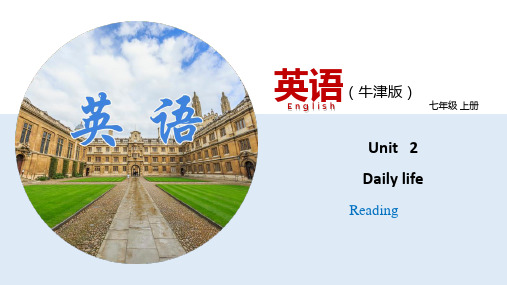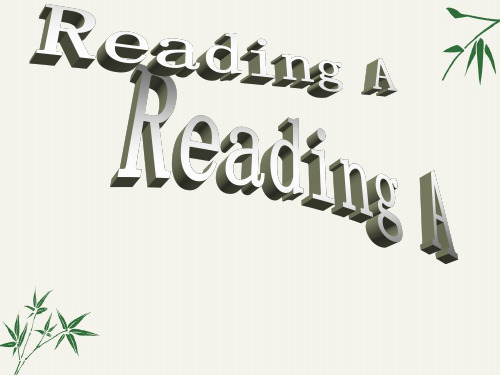优品课件之七年级英语上Unit2 daily life(牛津深圳版)
七年级英语上册 Unit 2 Our daily life 课件 牛津深圳

•1、纪律是集体的面貌,集体的声音,集体的动作,集体的表情,集体的信念。 •2、知之者不如好之者,好之者不如乐之者。 •3、反思自我时展示了勇气,自我反思是一切思想的源泉。 •4、在教师手里操着幼年人的命运,便操着民族和人类的命运。一年之计,莫如树谷;十年之计,莫如树木;终身之计,莫如树人。 •5、诚实比一切智谋更好,而且它是智谋的基本条件。 •6、做老师的只要有一次向学生撒谎撒漏了底,就可能使他的全部教育成果从此为之失败。2022年1月2022/1/112022/1/112022/1/111/11/2022 •7、凡为教者必期于达到不须教。对人以诚信,人不欺我;对事以诚信,事无不成。2022/1/112022/1/11January 11, 2022 •8、教育者,非为已往,非为现在,而专为将来。2022/1/112022/1/112022/1/112022/1/11
8. Does Cheng Na sleep for about five hours a night? N
Read the passage again and answer the questions:
1 How old is Cheng Na? 15 years old.
2 What does she do every morning?
the picture
1. Cheng Na is probably ___B_____most other students.
A. the same as B. different from 2. I will find out about ___A_____.
A. Cheng Na’s daily life B. Cheng Na’s holidays
牛津深圳版英语七上Unit 2《Daily life》(Grammar)ppt课件

以上我们已经通过归纳总结和练
习对本课的语法内容有了一定的
了解,下面就让我们根据
之前练习的考察情
况进一步选择讲解
该语法项的重难点。
The forms of the simple present tense
school? (drive)
S2:____, she ______ her own ___. Yes car drives
3. S1: How often ____ she _____ cakes to does make
her daughter? (make, sometimes)
S2: She ____________ to her daughter makes cakes
2) 客观真理,客观存在,科学事实
The earth moves around the sun. Shanghai lies in the east of China. 3) 表示格言或警句中。
Pride goes before a fall. 骄者必败。
一般现在时的疑问句形式及回答:
Do I/you/we/they play the guitar? Yes, I/you/we/they do. No, I/you/we/they don’t.
always usually often sometimes seldom never
Practice
Talk about the different ways Sam and his classmates go to school, using adverbs of frequency. Follow the example.
Unit2 Daily life Reading(课件)-七年级英语上册(牛津深圳版)

Paragraph 4 Lunch is from 11:50 a.m. to 12:30 p.m.
Paragraph 5 I always have a good time at school.
Read the first sentence of each paragraph. Then answer the questions.
I love going to school.
I always have a good time at school.
2. Find two sentences in the article to show that Sam likes sports very much.
When the bell rings, I run to the playground with my best friends Tom and Jack . We often play sports.
1 Classes start at 8 a.m., and I am seldom late.
a often
b not often
2 We have our morning break at 9:50 a.m.
a a short time between lessons b a short holiday 3 When the bell rings, I run to the playground with my best friends
friends usuallyp_l_a_y_g_a_m_e_s_. Lunch time: from _11_:_5_0__a._m_._to _1_2_:_3_0_p_._m_._.
Afternoon: Classes end at _3_:_3_0_p_._m_.__ Sam takes part in _th_e__sc_h_o_o_l_b_a_n_d__p_ra_c_t_ic_ewith his friends
牛津深圳初中英语七年级上册Unit 2 Our daily life 课件

Action Get up On the way to school Have English class Have lunch Correct homework Prepare for the lesson
What about your daily life?
the title: A day in the life of … The subtitle: Whiz-kid Cheng Na
5. Does Cheng Na always have lunch at school? DK
6. Is Cheng Na good at basketball? DK
7. Do Cheng Na and her family talk about business at breakfast and at dinner? DK
2. What do you often do in the afternoon/ evening?
12:15 p.m. 5:00 p.m. 8 p.m. p.m. = in the afternoon/evening
Time 6 a.m. 7:30 a.m. 8 a.m. 12:30 p.m. 4:15 p.m. 8 p.m.
8. Does Cheng Na sleep for about five hours a night? N
Read the passage again and answer the questions:
1 How old is Cheng Na? 15 years old.
2 What does she do every morning?
Discusses business with her parents at breakfast.
牛津深圳初中英语七上Unit 2《Daily life Reading》课件

Jason _g_o_es__to_s_c_h_o_o_l _ at 7_:_2_0_a_._m_..
Helen_w_a_s_he_s_c_lo_t_h_es__ at 2:00p.m. Harry _p_la_y_s _b_as_k_e_tb_a_ll__at 2:00 p.m.
Ivy h_a_s_c_la_s_s_es_…at 5:00 p.m. Kelly _fl_y_k_it_es___ at 5:00 p.m.
Words & phrases review
end v. 结束;终止 band n. 乐队 practice n. 练习 together adv. 在一起 junior high school 初级中学 on foot 步行 take part in 参加 have a good time 过得愉快
视频欣赏
Do you know about the daily life of the students from other countries?
Answer theGfoeltlotwininggRqueeasdtiyons.
➢Where are Hi and Lo? At the school gate.
She is the singer in the _b_a_n_d_. n. 乐队
It takes a lot of p__ra_c_t_i_ce_ to play the
piano well.
n. 练习
Our family usually has dinner _to_g_e_t_h_e.r adv. 在一起
conj. 因此,所以
We usually go to school _o_n_f_o_o_t_. 步行
Unit 2 Daily life 课件9.2(牛津深圳版七年级上册)

N 1. Does Wendy have breakfast
at 6 p.m.?
Y 2. Can Wendy write computer games?
N 3. Does Wendy drive herself to
school?
Y 4. Do Wendy’s school friends like her?
Activi Get up -ties Wash Have breakfast
Have Have Class is classes lunch over (four Play classes basketin the ball morning) after school
1. What time does he/she usually get up?
8. assist v.帮助=help assist sb with sth 帮助某人某事 assist sb in doing sth 帮助某人做某事 eg.We should assist our parents with housework at home.
9. seldom adv.很少(表否定的副词) eg. He seldom eats breakfast.
Look at the form and talk about your daily life
Time 6:30 7:30 Go to school (by bus/bike /car/on foot) 8:00 12:00 17:10 7:00 Have dinner Watch TV Do home work
achieve duty attend exam assist expect go to bed
v.失败,不及格 adj. 乏味的 v. 得到,获得
2016牛津深圳版英语七上Unit 2《Daily Life》(ReadingA)ppt课件

1. seldom 2. break 3. rings 4. end
A. often B. not often A. a short time between classes B. a short holiday A. makes a sound B. is quiet
A. stop B. begin
Pre-reading
(1) do every day? (2) do once or twice a week? (3) never do?
brush my teeth.
watch television.
(1) do every day? (2) do once or twice a week? (3) never do?
2. Why does Sam like Geography best?
He goes to school on foot. 2. What subjects does Sam usually study in the morning?
Chinese, Maths and English. 3. How long is the school lunchtime? 40 minutes long.
ride a bicycle.
play table tennis.
(1) do every day? (2) do once or twice a week? (3) never do?
play the piano.
wash my clothes.
Pre-reading
B1 Look at the title of the article on page 17. Then circle the correct answers.
Unit 2 Daily life 课件13.6(牛津深圳版七年级上册)

play the piano
play computer games
课文探究
【想一想】 同学们,Chapter 2的Reading部分描 述了神童Wendy一天的生活。阅读的 时候,大家要注意思考以下几个方面 的问题:
1. 如何按照时间顺序描述自己一天的活动?
2. 在描述自己一天的活动时,如何正确运用
3. Does Wendy discuss her studies with her parents at breakfast? N 4. Does Wendy drive herself to school? N 5. Does Wendy like her school friends? Y 6. Does Wendy pass all her exams? Y 7. Does Wendy have lunch with clients every day? N
Read and think Here are some questions about Wendy. Answer them by writing Y or N. If the article does not give you information, write DK (Don’t know). 1. Can Wendy write computer games? Y 2. Does Wendy have breakfast at 7:30 a.m.? N
4. After school, I usually ____________. attend a club
5. I finish my homework _______________ in an hour or two
- 1、下载文档前请自行甄别文档内容的完整性,平台不提供额外的编辑、内容补充、找答案等附加服务。
- 2、"仅部分预览"的文档,不可在线预览部分如存在完整性等问题,可反馈申请退款(可完整预览的文档不适用该条件!)。
- 3、如文档侵犯您的权益,请联系客服反馈,我们会尽快为您处理(人工客服工作时间:9:00-18:30)。
七年级英语上Unit2 daily life(牛津深圳版)Unit Two Daily life教案授课教师日期时间学生年级初一科目英语课题牛津深圳版 Unit Two Daily life 教学目标要求掌握本单元的单词、短语,一般现在时教学重难点分析一般现在时的变化教学过程课前准备本周学校学习内容掌握本单元的单词、短语,一般现在时存在和要解决的问题动词碰到第三人称单数时,要进行相应的变化一般现在时的功能一般现在时常用下列副词或副词短语来作时间状语:一般现在时的构成知识要点概述 Unit Two Daily life Reading 1. Look at these pictures and answer the questions about your daily life. look at= have a look at 看一看; answer the questions= reply to the questions(reply to 更强调书面回答,较正式); daily life:日常生活 2. Which of these things do you do once or twice a week? 助动词do/does/did后面要跟动词原形; once a week, twice a week, three(four/ five…)times a week 3. brush one’s teeth刷牙; watch television= watch TV看电视; play table tennis打乒乓球;ride a bicycle骑单车; play the piano弹钢琴; wash my clothes= do some washing洗衣服拓展:wash one’s face; comb one’s hair; pack one’s bag; do some cooking; go shopping= do some shopping; play computer games 4. Look at the title of the article on page 17. Then circle the correct answer. the title of…: ……的标题; on page 17:在17页在具体体一天用on; 在具体几点钟用at; 在一段时间(如上/下午、星期、月份、季节、年),则用in on Monday; at 4 o’clock; in the morning; in summer; circle:圈出,划出;the correct answer:正确的答案 5. How does Sam go to shool? 特殊疑问句:特殊疑问词+ 一般疑问句 6. a day at school 学校的一天; by Sam: 由Sam写的 at school 在上学 at the school在学校(可能是老师或家长) in hospital: 生病住院 in the hospital: 在医院(可能是护士或家属) in bed: 卧病在床;躺在床上 in the bed: 在床上(被窝里); on the bed: 在床上(如枕头) 7. I am ajunior high school student. I love going to school. junior high school 初中 senior high school 高中 primary school 小学 love doing sth.= live doing sth. = enjoy doing sth.喜欢做某事practice doing sth.练习做某事 finish doing sth. 做完某事 go to school 去上学 8. My school is close to my home, so I always go to school on foot. be close to 离……近= near =beside= not far away from family 的意思是“家庭、家庭成员”,与居住的房子无关。
当family作为整体概念的“家庭”讲时是单数;当“家庭成员”讲时是复数; house 指“家”时含义较窄,仅指“房屋”这一建筑物,一般指独门独户的房子,不指楼房; home 指“家、住所”,指一个人(或一家人)居住的地方,也可指一个人出生或长大的地方(乡村、城市或国家等)。
它具有house所没有的感情色彩 always:总是.频率副词always/ usually/ often/ sometimes/ seldom/ hardly/ never 表示频率由多到少,是一般现在时的标志。
(位于be 动词之后,实义动词前)对频率提问用 how often go to school on foot= walk to school步行去学校go to…on foot = walk to … 9. Classes start at 8 am, and I am seldom late. start at: 几点开始 be late: 迟到 be late for school 上学迟到 10. I enjoy learning about different places in the world. enjoy doing sth= like/love doing sth. very much 喜欢做某事 learn about:获悉;了解 different places in the world: 世界各地 11. We have our morning break at 9:50. have one’s morning break: 上午休息时间 have a break 课间休息 have a rest 休息一会 12. When the bell rings, I run to the playground with my best friends Tom and Jack. when:当……的时候此处连接两个先后发生的动作;也可表示两个动作同时发生,则:“过去进行时+ when+ 一般过去时”;另外, when也可对时间提问,“何时” run to…with sb. 和某人一起跑到…… my best friends: 我最好的朋友们 13. Break ends at 10:10. How Short it is! end at: ……时间结束 how+ adj. (+主+谓) = what+ (a/an) + adj.+ n. (+主+谓) how 主要修饰形容词和副词, what修饰名词。
How short it is! = What short time itis! 14. Lun ch is from 11:50 to 12:30 p.m. from…to… 从……到…… from Monday to Friday 15. Then Tom, Jack and I take part in the school band practice. take part in:参加,指参加会议或群众性活动等,着重说明句子主语参加该项活动并在活动中发挥作用; join指加入某个党派,团体组织等,成为其成员之一,意为:“参军、入团、入党”等; 和某人一道做某事,其结构为:join sb. in (doing) sth.,根据上下文,in (doing) sth. 也可以省去(join in 多指参加小规模的活动如“球赛、游戏”等,常用于日常口语); attend是正式用语,指参加会议、婚礼、典礼;听报告、讲座等。
He'll attend an important meeting tomorrow.他明天要参加一个重要会议 band: 乐队 the school band practice: 学校乐队练习practice: 名词:练习 Learning a language needs a lot of practice. 动词 practice doing sth. practice sth practice the violin practice playing the piano practise 实习.实践.指有规律的练习,特指反复练习,不断练习,如大音乐家需要不段的practice exercise是练习,一般用语,可指训练,锻炼,操练等.如spelling exercise(拼写练习), ,lack of exercise缺乏练习,do one's exercise做练习, physical exercise体育锻炼 exercise的用法:1.作可数名词用,“练习,习题,体操,功课,操练”等,常用复数。
I'm doing my exe rcises.我在做练习/功课。
Doing morning exercises is helpful to our health.做早操对我们的健康是有益的。
You should do more spelling exercises. 你应该做更多的拼写练习。
2.作不可数名词用,“锻炼,运动”。
You are weak because of the lack of exercise.你身体弱是因为缺少锻炼。
Take more exercise, and you will be healthy.多多锻炼,你会健康的。
3.作动词用,“训练,锻炼”。
You must exercise yourself in order to be stronger and healthier.为了更健康更强壮,你必须锻炼自己。
16. We make great music together. 我们一起演奏动听的音乐。
make是初中英语中出现频率很高的一个动词,它的用法主要有; make/ have/ let sb. do sth. 使某人做某事 make sb. +adj.做某人…… make fr iends交朋友 make cakes做蛋糕 make a noise发出噪音 make yourself at home像在家里一样自然 make sure确保go to …together 一起去 together with 与……一样(常用作插入语) 17. I always have a good time at school. have a good time = enjoy oneself= have fun 玩得开心 at school 在学校Unit Two Daily life Language 一、一般现在时的功能 1.表示事物或人物的特征、状态。
